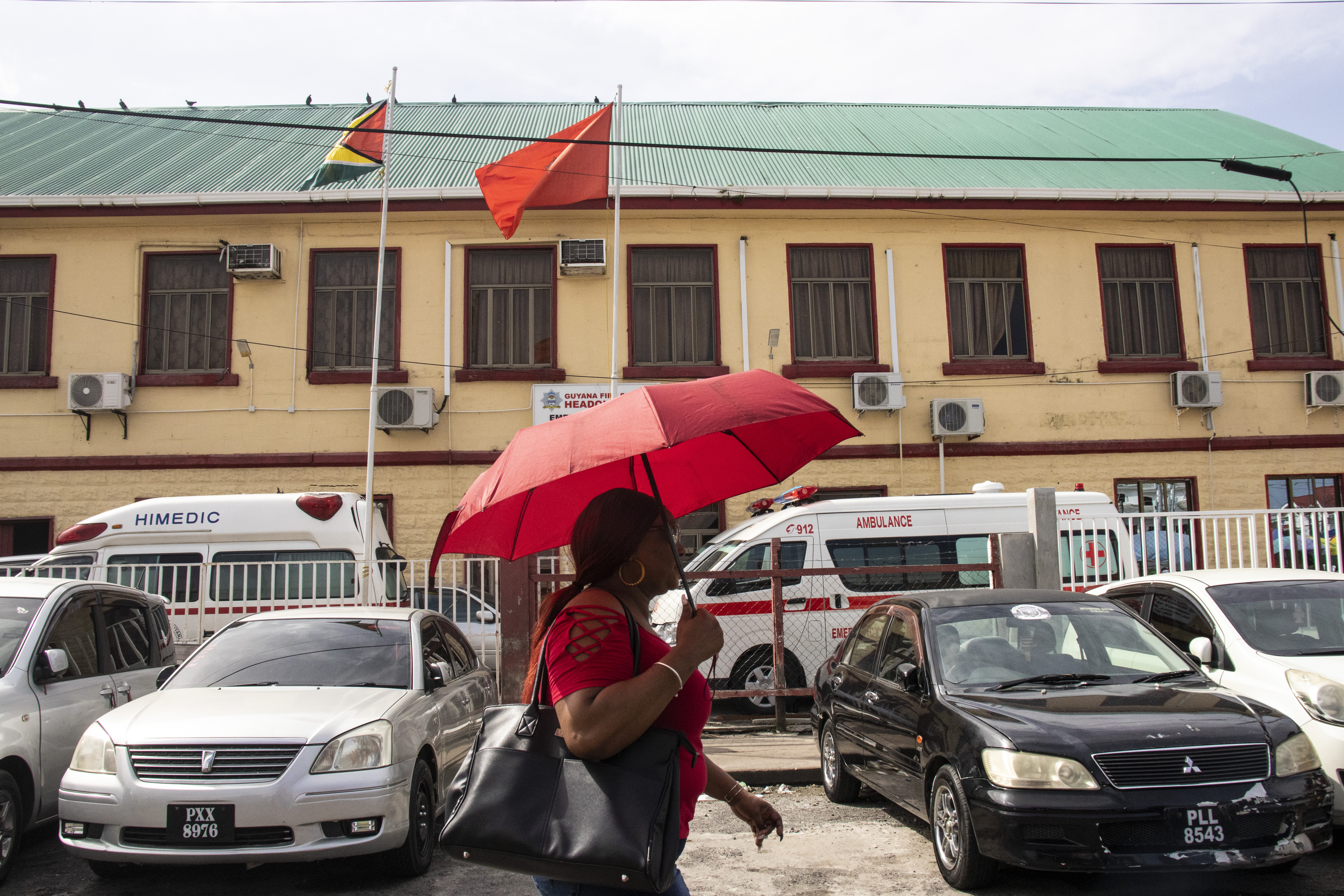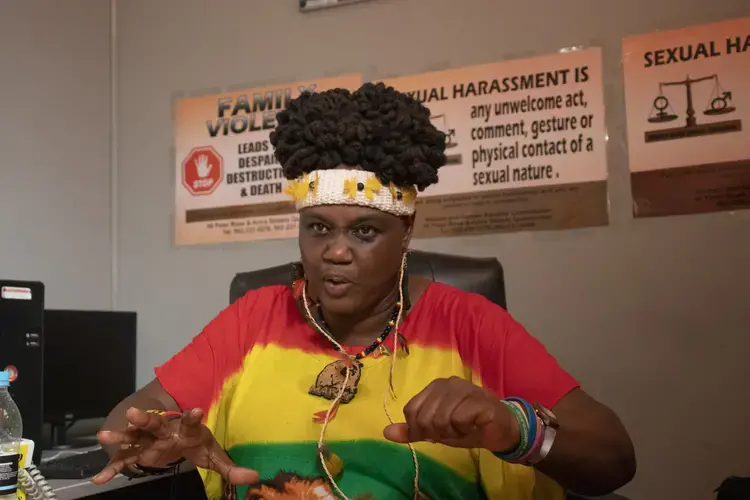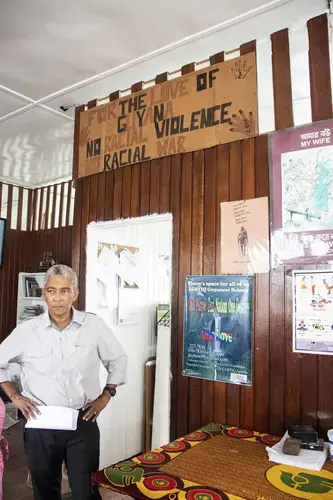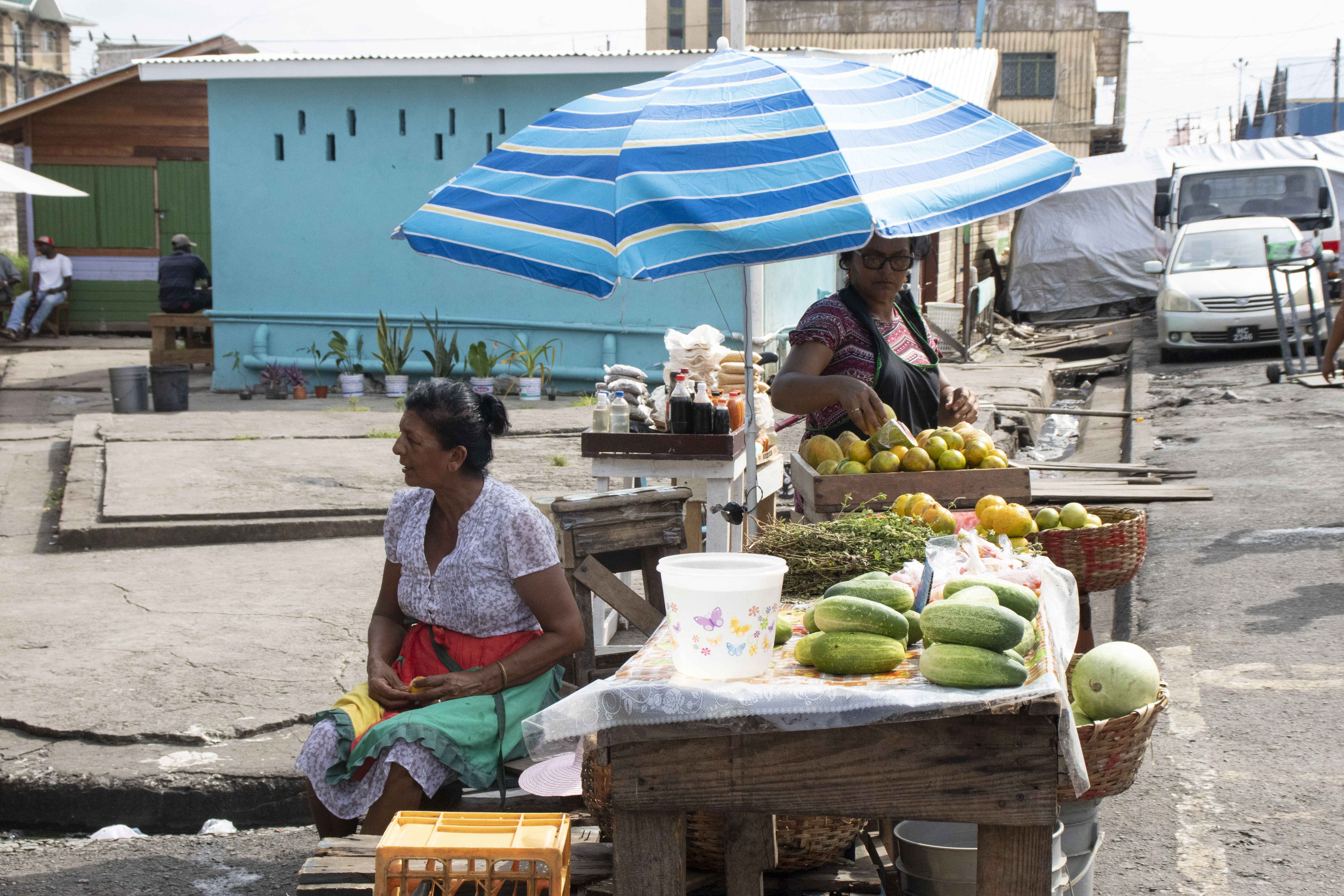
Shondell Williamson. Kimanie Watson. With each name and each story, the passion in Nicole Cole’s voice intensifies because her story could have ended like theirs.
Shondell Williamson was in her home about a two-hour drive east of Georgetown, the country’s capital, when the father of her children, whom she had left after an abusive relationship of more than eight years, entered and attacked her with acid. Alfred De Jonge, her alleged attacker, had reportedly traveled from Linden, more than 135 miles away, and stalked her in a wig and a dress before carrying out the attack. Williamson was left blind and her face and upper body disfigured, Cole said.
Kimanie Watson, a 2-year-old, was one of the youngest victims of sexual violence. The child died in 2013 after sustaining abdominal injuries consistent with anal penetration while left in the care of her teenage uncle. The teenager has been charged with murder.
Cole speaks as if the dark gray walls of her office, adorned with posters pleading to end domestic and sexual violence, could close in at any minute. She and her son escaped an abusive relationship when her aunt provided her with a place to stay where her ex could not reach her.

Cole is an elected official, a member of Guyana’s Women and Gender Equality Commission, along with the Rights of the Child Commission. She is also a licensed social worker and has lobbied for the treatment of violence against women as a public health issue.
Despite its prevalence in the country—more than one in two women said they had experienced some form of intimate-partner violence—the country has no established system to help survivors, and few resources.
In the 2019 survey by UN Women, 55 percent of Guyanese women who participated said they had experienced some form of intimate-partner violence. More than 1 in 10 of those incidents had happened within the past year. Gender-based violence contributes heavily to Guyana’s suicide rate, the highest in the world, with many murder-suicides between intimate partners.
In 2018, the most recent year for which statistics are available, 1,787 cases of domestic violence were reported to the police. Guyana’s police department has not released, nor responded to requests for statistics on cases of domestic violence reported in 2019.
A Violent Colonial Past
The problem is one that has plagued the country and only seems to be getting worse, according to advocates. In 2018, there were 20 reported cases of femicide compared to 13 the previous year, according to a report by the Guyana Empowered Peoples Action Network.
In tracing the colonial roots of gender-based violence, scholars point to the power structures enforced in both slavery and indentured servitude.
“This society that we live in was born out of an ugly past of slavery and violence,” said Cole.

"When the British exited Guyana in 1966, they left behind a rum culture, a legacy of alcoholism and diabetes, and a grudge match between black and brown workers,” wrote Guyanese author Natalie Hopkinson in her book A Mouth is Always Muzzled: Six Dissidents, Five Continents, and the Art of Resistance.
The perilous journeys of the two largest ethnic groups in the country originated across the world in Africa and Southeast Asia. Some journeyed willingly, while others were captured and enslaved, or tricked onboard ships destined to the South American country, whose economy relied heavily on its sugar plantations.
As a Dutch, and then British colony, Guyana participated in the trade of enslaved Africans until 1834, following Britain’s abolition of slavery. At the time of their emancipation, roughly 97 percent of the population was African.
To alleviate the loss of stolen labor, the country began importing indentured servants from India in 1838.
According to Guyanese author Gaiutra Bahadur in her book Coolie Woman: The Odyssey of Indenture, a social hierarchy unfolded, with freed African people above indentured servants and male indentured servants above women.
Life on the sugar plantations for enslaved and indentured women was marked by many conditions that have contributed to the existing power structures perpetuating violence against women.
On the ships and sugar plantations, enslaved and indentured men, as well as male plantation owners and ship officials, greatly outnumbered women.
Bahadur wrote that this condition gave indentured women sexual leverage, but also left them vulnerable to violent acts by scorned lovers and jealous hopefuls. Between 1859 and the end of indenture in 1917, more than 167 women were killed by intimate or would-be intimate partners in Guyana.
To enforce control over enslaved people’s bodies, slaveholders would often physically punish the people they viewed as property, emasculate enslaved men, and prohibit the formation of families.
It was common for enslaved women to be physically and sexually brutalized by white plantation owners and overseers, and few hid their violent acts, according to Hopkinson. Enslaved African women were also prostituted to make money for plantation owners.
Violence has manifested in multiple forms.
The practice of whipping children, or “giving licks,” as a method of discipline, is common in the country. However, some say it contributes to the normalizing of violence in their culture.
Posters for positive parenting are sprinkled throughout the city, asking parents to consider giving support, not licks. A 2014 study in the Journal of Pediatrics notes a direct linkage between corporal punishment of children and women’s acceptance of domestic violence.
“There’s a high tolerance toward violence,” said Danuta Radzik, director of the nongovernmental organization Help & Shelter. Along with domestic and intimate-partner violence, she lists child abuse and sexual violence as those plaguing Guyanese society.
More than 50 years after its independence from Britain, Guyana still carries laws written under the British legal system, including some that Britain has since changed. Same-sex relationships between men in Guyana are punishable by up to two years in prison. The United Kingdom passed a law allowing same-sex marriage in 2013.
Remnants of that system of ownership and the practices of their colonizers have carried over to modern-day practices in the country and have spread with the Guyanese diaspora.
Simone Jhingoor is one of the co-founders of Jahajee Sisters, a group of Indo-Caribbean women in New York organizing to end gender-based violence. The word Jahajee comes from the Hindu word jahaji, meaning shipmate, as a nod to the Indian ancestors’ journeys to Guyana under indentureship. New York is home to one of the largest populations of Guyanese outside of Guyana.
In 2007, the group was planning a women’s empowerment summit when 20-year-old Natasha Ramen was murdered by a fellow Guyanese immigrant who was out on bail after being charged with her rape. Not soon after the summit, 22-year-old Guiatree Hardat was shot and killed by her fiancé.
“The decision was made collectively that we can’t let this happen anymore,” said Jhingoor, who is also a survivor of an abusive relationship.
New York’s Indo-Guyanese community was rocked yet again by the murder-suicide that claimed the lives of 26-year-old Stacy Singh and her husband Vishwanand Loknath. Loknath reportedly stabbed his wife multiple times before hanging himself in New York City’s Forest Park.
The community of activists fighting gender-based violence is populated by women who have experienced this violence themselves.
Melissa Atwell, known by her Facebook nickname “Melly Mel,” shares the stories of survivors and aids in getting them the resources to relocate if need be. Atwell said she left a long-term abusive relationship with a son and a broken jaw.
She’s teamed up with Michelle Nicholas, a licensed social worker who now resides in New York, who connects survivors with counseling and other resources. Nicholas said she was sexually assaulted in her adolescence in Guyana.
Nicole Cole advocates for changes to laws and protections for victims. She acknowledges that many stories do not end like hers because of a lack of resources. Cole had a support system many victims of domestic violence do not have and has called for the government to establish a fund for survivors of domestic violence.
In many cases, she said, women have turned their backs on their families to be with their abusers. In other cases, they return to their abusers because they have no financial means to support themselves or their families, said Radzik.
Guyana’s failing system
Once a woman decides to leave an abusive situation in Guyana, she has two options.
Under the Domestic Violence Act of 1996, which began implementation nearly 20 years later in 2015, women can go straight to the court system for protection orders.
However, the rule still has its issues, said advocates.
Under the act, once a person files for a protective order, they must accompany the police to identify their alleged abuser. Returning to those dangerous environments has sometimes resulted in survivors being assaulted again, or even killed in the process, said Radzik.
Additionally, advocates say the country simply does not have the infrastructure to uphold the Act, especially in its interior, where its most vulnerable populations are.
“Unfortunately, Domestic Violence [Act] cannot work in any interior locations because they don't have the support system. They don't have enough police stations. They don't have courts that meet regularly every day. They have no place to take an offender if they need to be detained,” said Radzik.
“It’s just laughable,” she said.
Courts in the hinterlands had only been meeting quarterly since their establishment.
According to Detective Deputy Superintendent Leslyn Halley-Smith of the Guyana Police Force, there are “not enough shelters, nor enough funding to take up the burden” of addressing gender-based violence.
Survivors of domestic violence also have the option to report their abuse to police.
However, lack of trust between survivors of gender-based violence and the police force, along with stigmas targeting survivors prevent many from reporting their abuse or following through on reports.
“I am not impressed with the way the Guyana’s police force deals with domestic violence,” said Atwell, also referring to officers as “lackadaisical,” when it comes to dealing with gender-based violence. Some of the perpetrators of violence against women have been police officers, themselves.
“We have a lot of work to be done, as far as the attitudes of personnel,” said Detective Deputy Superintendent Leslyn Halley-Smith of the Guyana Police Force. Both Halley-Smith and Atwell cited instances where police officers handling cases of domestic violence do not take accusers seriously because of the number of times a victim reports the same abuser.
“She's been here before. She's been here three times, four times, five times before, but she's gonna go back anyways,” is a common refrain, according to both the officer and the advocate.
The stigma attached to gender-based violence follows survivors beyond the police station. Nicholas recalls nurses in hospitals distributing photos of patients in hospitals who had been victims of domestic violence.
As a survivor of sexual assault, she was afraid to report. “It was hard to talk about because you knew what would come,” Nicholas said. “You knew that you would be ridiculed. And for a long time, I never talked about it.”
“As a society, we have a way of making victims feel ashamed, or as if they did something wrong,” said Atwell.
Despite the conditions facilitated by a colonial past, activists are adamant that Guyanese people must take responsibility for the violent actions happening there every day.
“It's an easy thing to do, shift the blame back to colonialism, but it's also a cop-out,” said activist Vanda Radzik. “It's far more, I think, about the inherent power play of male dominance and control in nearly every ethnicity and culture the world over.”
“Gender-based violence is a huge issue in our community, but I don't think it's an issue of just our community,” said Jhingoor. "It’s the one issue that cuts across class and race.”







